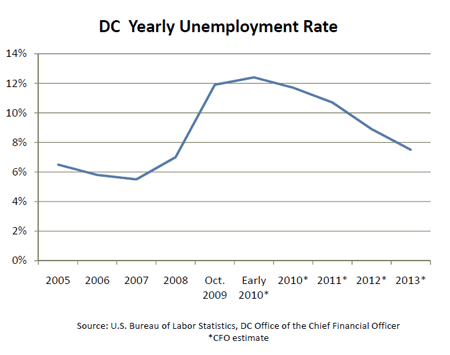Each December, as many of us eagerly anticipate the gift-giving holidays, DC budget watchers look forward to the Chief Financial Officer’s quarterly report on the city’s economy and its finances. We hope for a bountiful package, but in the last few years we’ve received quite a bit of bad news.
CFO Dr. Natwar Gandhi’s latest report, delivered earlier this month, shows the recession continues to pummel city finances. Revenue will fall another $104 million next year. As for the economy, Gandhi pointed to some signs that the worst of the downturn might be behind us. But sadly, the road to full recovery likely will be long and winding. This means that for many DC families, 2010 will prove to be another very challenging year.
Take unemployment. Gandhi projected that DC’s unemployment rate, which reached a 34-year high in 2009, will continue to rise in early FY 2010, peaking at 12.4%. It will start to fall after that but slowly. The forecast shows unemployment won’t fall below 10 percent for two more years.
According to Gandhi, more than 18,000 District residents lost their jobs in 2009. And those jobs will be lost for a while. The new figures suggest employment among DC residents won’t return to the pre-recession level until 2013.
Not surprisingly, the loss of jobs has taken a lot of money from DC families and the DC economy. Work-related earnings fell more in DC than in the rest of the nation in 2009. The wage loss totaled $800 million, which equals an average of $2,000 for every household.
What can we learn from these numbers? The economy doesn’t rebound immediately from a downturn. When economists declare a recession over, it simply means we’ve hit bottom. It doesn’t mean the problems for DC residents are over. Recovery takes time. It will be important over the next year to continue supporting families and individuals who are struggling from the effects of the recession. The District also should invest in its workforce by funding programs that help people stay or move into jobs. That’s important to moving faster down the road to recovery.

